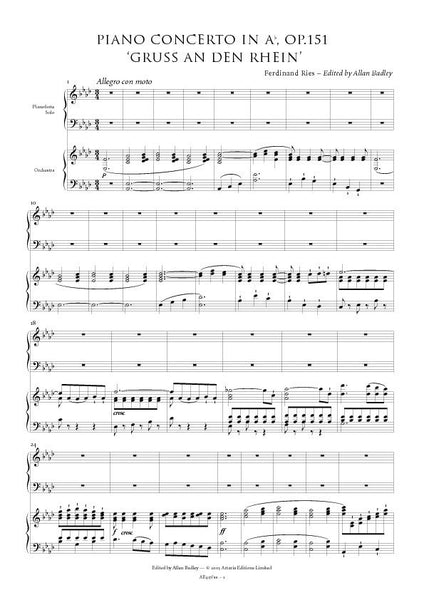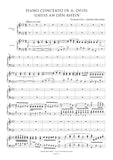Description |
Ries, Ferdinand (1784-1838)
|
||||||||||||||||||||||
Audio sample |
|||||||||||||||||||||||
Details |
Ferdinand Ries (1784-1838) was one of the greatest pianists of his time and a composer of exceptional abilities. Ries studied pianoforte (but not composition) with Beethoven in Vienna and the two men remained on cordial terms for the rest of their lives. In the last year of his life Ries co-wrote a book of Beethoven reminiscences that remain one of the most valuable sources of information about his life and character. Ries composed prolifically in many genres and unsurprisingly left an important body of works for pianoforte and orchestra. The Piano Concerto in A-flat, Op.151, was composed at Bad Godesberg in 1826 two years after his return from London where he was based for eleven years. Ries subtitled the work 'Gruss an den Rhein', an affectionate tribute to the area in which he grew up, and the broad, gentle sweep of the first movement is clearly intended to depict the Rhine. Although the movement is still organized along the same structural lines as Beethoven's concertos it inhabits a very different emotional world. The piano writing too is very different, looking forward to that of Chopin rather than back to Beethoven's great middle period masterpieces. The mood of serenity persists in the exquisite Larghetto, a movement that possesses an almost Beethovenian sense of gravity, but is dispelled at once with the ferocious opening to the finale. Ries prefaces this brilliant and ingenious Rondo with a dazzling cadenza introduced by the full orchestra. The movement demands not only a high degree of virtuosity and showmanship from the soloist but also but also the intelligent musicality to bring out all the subtleties and beauties of Ries's writing for the instrument. Allan Badley |
||||||||||||||||||||||
Performance |
- | ||||||||||||||||||||||
Score Preview (best viewed in full screen mode) |
|||||||||||||||||||||||
Once again, postal service to the USA is disrupted. Click for details close
Loading...
Error






![Ferling, Franz: Double Oboe Concerto in F major [Study Edition] (AE376/SE)](http://www.artaria.com/cdn/shop/products/AE376_SE_Score_1stpage_1_large.jpg?v=1571438515)

![Hofmann, Leopold: Cello Concerto in C major (Badley C1) [Study Edition] (AE029/SE)](http://www.artaria.com/cdn/shop/products/AE029_Score_B4_1stpage_000001_large.jpg?v=1571438516)
![Hofmann, Leopold: Cello Concerto in C major (Badley C3) [Study Edition] (AE001/SE)](http://www.artaria.com/cdn/shop/products/AE001_SE_Score_1stpage_1_large.jpg?v=1571438517)
![Hofmann, Leopold: Cello Concerto in D major (Badley D1) [Study Edition] (AE063/SE)](http://www.artaria.com/cdn/shop/products/AE063_SE_Score_1stpage_1_large.jpg?v=1571438516)
![Hofmann, Leopold: Cello Concerto in D major (Badley D3) [Study Edition] (AE030/SE)](http://www.artaria.com/cdn/shop/products/AE030_SE_Score_1stpage_1_large.jpg?v=1571438516)
![Hofmann, Leopold: Flute Concerto in A major (Badley A2) [Study Edition] (AE143/SE)](http://www.artaria.com/cdn/shop/products/AE143_SE_Score_1stpage_1_large.jpg?v=1571438516)
![Hofmann, Leopold: Flute Concerto in D major (Badley D1) [Study Edition] (AE142/SE)](http://www.artaria.com/cdn/shop/products/AE142_SE_Score_1stpage_1_large.jpg?v=1571438516)
![Hofmann, Leopold: Flute Concerto in D major (Badley D3) [Study Edition] (AE139/SE)](http://www.artaria.com/cdn/shop/products/AE139_SE_Score_1stpage_1_large.jpg?v=1571438516)